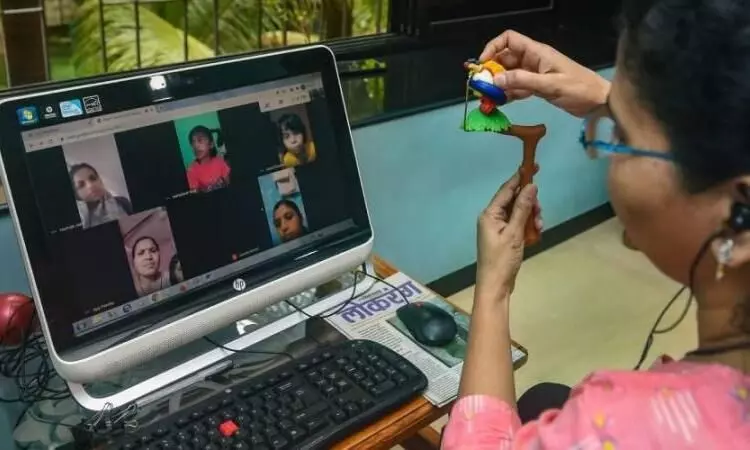
Digital tools helpful for in-class teaching in rural govt schools: Survey
text_fieldsRepresentational Image, credit: PTI
New Delhi: When it comes to effective method of teaching, in-class instruction fares better than online ones, finds a survey.
Sampark Foundation digitally surveyed over 4,000 teachers from government schools in sub-urban and rural areas of Himachal Pradesh, Chhattisgarh, Haryana, Jharkhand, Uttarakhand and Uttar Pradesh.
It was aimed at better understanding the needs of government school teachers who are using remote learning tools to teach students during the coronavirus pandemic.
The key finds say 68 per cent requested videos on the curriculum that can be easily shared with children.
Another 60 per cent responded with the need for reading material and notes to be designed specifically for each class.
In more creative approach, 51 per cent marked 'social platform' as a vital feature in learning apps to connect with other teachers and exchange ideas
Meanwhile, 46 per cent responded with 'question bank' as a key feature to prepare tests/worksheets.
Of those surveyed, 39 per cent are in favour of sending online assessments to students.
31 per cent emphasised the need for a performance tracking dashboard, built in the learning app to monitor each student in a careful manner.
68 per cent teachers voted for in-classroom teaching as an effective education method for children studying in primary government schools in rural areas.
46 per cent respondents were in favour of live online classes via WhatsApp, video call or any other app.
21 per cent were keen to record their own lectures and share with students via mobile phone
The survey finds majority of teachers as having access to as television (50 per cent), while 40 percent of teachers have infrastructure such as smartphones (40 per cent), 32 percent turn to feature phones and 24 per cent resort to radio.
44 per cent teachers emphasised the need for textbooks and notes to be handed over directly to students.
The survey also reported that 33 per cent teachers leverage videos shared on YouTube, Baithak, Diksha and other apps, to teach students.
Teachers agreed that broadcasting educational programs on television or radio might be an effective education method, provided the content is simple, interesting and impactful for students.
Over 28 per cent teachers also stressed upon the importance of weekly visits to children's homes and teaching in a group of 3-5 students in one session.
Children in government schools in rural areas find directly calling teachers over phone, an effective medium to solve doubts and queries, which in turn improves learning outcomes, the survey found.
However, 59 per cent respondents also considered students discussing their queries and doubts with elder siblings, relatives, and educated people in their neighborhood.
Close to 60 per cent of the teachers surveyed, are in favour of live video classes conducted by them on WhatsApp.
Over 40 per cent prefer to resolve student's queries once a week in person. The survey also highlighted peer-to-peer doubt resolution on a digital discussion forum, as an effective medium to solve student queries.
Addressing impactful methods of learning assessment, 54 per cent teachers voted for online quiz while 52 per cent were in favour of questions asked during live online classes.
48 per cent found printed assessments as effective means of learning assessment and 25 per cent requested for an assessment app or an online platform for students.
IANS report with edits























